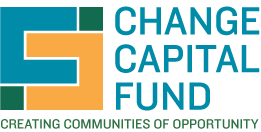Ensuring Success, No Matter What!Change Capital Fund (CCF) grantees are taking a long-term approach to serving individuals who come through their doors–and that includes helping people overcome all the barriers that stand between them and their future success. Traditionally, nonprofits have been tasked with providing one-time services based on immediate client needs, but that approach provides only temporary relief. Taking the long view with a holistic approach is proving to be highly successful and a model that other opportunity-building nonprofits could adopt, but only if they are supported through adequate resources, like the CCF grantees.
[space_20]
Take Aaron, a 33-year-old father of one who came to Fifth Avenue Committee (FAC) looking to
earn his high school equivalency diploma (formerly known as GED). “I wanted to improve my prospects in life and be able to take better care of my daughter and myself,” says Aaron, who had gotten by on odd jobs and seasonal work for his entire adult life. [space_20]
Aaron had tried to earn his diploma and a college Associate’s Degree in 2005, but due to instability in his personal life, he dropped out. “You can’t expect someone to come to class every day if they don’t have a steady place to live or are unable to put food on the table. We’re now focused on addressing all the barriers that prevent people from moving ahead,” says Brian Mendes, Associate Director of Education at FAC. “At the same time, we ask ourselves ‘what will it take to move this person out of poverty?’, and we–along with our Stronger Together partners–provide each individual with the integrated services they need to move ahead.”
[space_20]
FAC launched the Stronger Together collaboration with a grant from CCF. Through Stronger Together, FAC partners with Brooklyn Workforce Innovations, Red Hook Initiative, and Southwest Brooklyn Industrial Development Corporation (SBIDC) to provide Brooklyn public housing residents with comprehensive services–including adult education, sector-based job training and placement, and community supports–that enable them to move up the economic ladder. [space_20]
For Aaron, these individualized and integrated services have included help earning a high school diploma, guidance preparing his resume, help securing proper interview attire, and assistance filing his back taxes. All of these services were provided by FAC. SBIDC then helped him prepare for job interviews and secured those interviews for him. The experience was seamless for Aaron. He got what he needed when he needed it. For the two nonprofits, it took hard work that included coordination across two agencies, four programs, several staff, and many funding contracts to make it work. It is a long-term investment, but it works. [space_20]
Today Aaron is employed by the New York City Parks Department. For the first time in his life, he has a job with benefits. This summer he will finally earn his high school diploma. “I can now talk to my daughter about school. And, I can finally do things for her–I bought her a bicycle and can take her out. I feel good about it,” says Aaron. [space_20]
|
Donor News[space_20]
Citi Foundation, in partnership with the Mayor’s Fund to Advance New York City, supported the creation and launch of the Collaborative for Neighborhood Financial Health, a new initiative headed by the Department of Consumer Affairs. The Collaborative works with residents and community groups to develop new approaches to empower residents to improve their financial health. Read more here. [space_20]
Enterprise hosted an interactive exhibition, Undesign the Redline, which described our country’s history of racial segregation, the legacy of which continues today. Nearly 1,000 visitors saw the exhibition, which kicked off Enterprise’s racial equity and inclusive communities initiative. As part of this initiative, Enterprise launched “Building Justice,” a blog with City Limits. |
|
|

